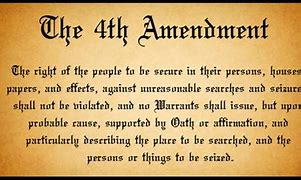In the past two postings, I have illustrated my support and commitment to the ideals of personal freedom enshrined in the Bill of Rights while at the same time advocating for common sense rewording of both the First and Second Amendments needed to eliminate confusion and misinterpretation. The Third Amendment is widely considered the least controversial amendment: “No Soldier shall, in time of peace be quartered in any house, without the consent of the Owner, nor in time of war, but in a manner to be prescribed by law.” Seeing little or no need for clarification to the 3rd, I am moving today to the 4th, worded as pictured above. The Fourth Amendment is a necessary guarantee of personal freedom that completely falters because it hinges on one ill-defined and often abused word, unreasonable. Nobody is ever going to be able to tell us exactly what that word means. Consequently, some clarification is in order.
Were the warrants for search and seizure at Ruby Ridge in 1992 and at Waco, Texas in 1993 reasonable or unreasonable? It depends on who you ask. Many commentators point to those two incidents as catalysts that fueled the homicidal actions of Timothy McVeigh as well as the current rise in opposition to firearm regulation. Without getting back into a discussion of the right to bear arms, what is the government’s right in monitoring and questioning the motivations of potentially homicidal and heavily armed groups?
Put as simply as possible, the government does have a share in the general need to protect the public from dangerous extremists, but it does not have the right to military style action merely on the basis of the suspicion of nefarious intent.
In both Ruby Ridge and Waco, Texas warrants were issued and resisted, and then the government responded with force. The government asserts that in both cases there was “probable cause, supported by Oath or affirmation, and particularly describing the place to be searched, and the persons or things to be seized.” Reasonable? Well, both cases have been adjudicated, so the imprimatur of reasonableness has been re-established after the facts.
Because warrants were lawfully issued but met with unlawful resistance, the actual reasonableness has never been satisfactorily determined.
Proposed additional wording to be added to the end of the Fourth Amendment:
All Americans are guaranteed the right to petition the government for redress of grievances. Therefore, governmental warrants of search and/or seizure shall be subject to judicial appeal and shall not be considered, in and of themselves, to be proof of guilt.


Whitehouse for the White House! The next president should be another progressive senator in our Long March. Check out the complaint from the following stinking piece of sedition. “Upon request!” Yes, that is all we need now, not a subpoena.
https://fairtax.org/articles/the-chairmans-report-december-9-2022?utm_source=deployer&utm_medium=email&utm_campaign=FAIRtax+News
Leon: Thank you for the link! Despite the highly partisan tone of the article, I find myself agreeing with the basic tenets. The IRS is far too cumbersome and too full of juicy loopholes available largely for those with enough money to hire big law firms. Furthermore, it should never be weaponized for use in the political arena.
A much simpler form of taxation would benefit us all!
In 2022 unreasonable is said to be “ill-defined and abused” (it was understood back in 1791) while “common sense” apparently is not. Dictionaries help.
This reminds me, the US Army taught McVeigh how to kill which he practiced in Iraq. Oswald learned rifle accuracy in the US Marine Corps. While both murderers enlisted, we must never have a draft again. Abolish the Selective Service Administration.
The “right to petition the government for redress of grievances,” a form of lobbying, is in the First Amendment. I think you mean due process.
Richard, the word “unreasonable” connotes an abstract concept, which makes its meaning highly subject to debate and disagreement. Or should I say misagreement? As I hope I implied, the Founding Fathers were well seasoned in common sense, and they should be applauded for putting together a document that forged our nation and calmed the fears of some hot-headed individuals. Their efforts produced the document we live by.
I am unclear as to why you brought up McVeigh and Oswald in connection to your opposition to the Selective Service Administration and a potential draft. We are chugging along pretty well without a draft currently, but, as a two year draftee from the Vietnam era, I wouldn’t rule it out entirely. Also, I defer to Country Joe on this matter.
I know where the right to petition the government for redress of grievance is enunciated. If the protections of due process fail us, we have the right to petition. It would be unwise to conflate the two.
The old constitution is obsolete.
I have no complaints with the Constitution. My only complaints are that the Bill of Rights should be enshrined, not as amendment after thoughts, but as an integral part of the original document. I also think the wording should be clarified to convey more precisely the necessary balance between governed and governing.